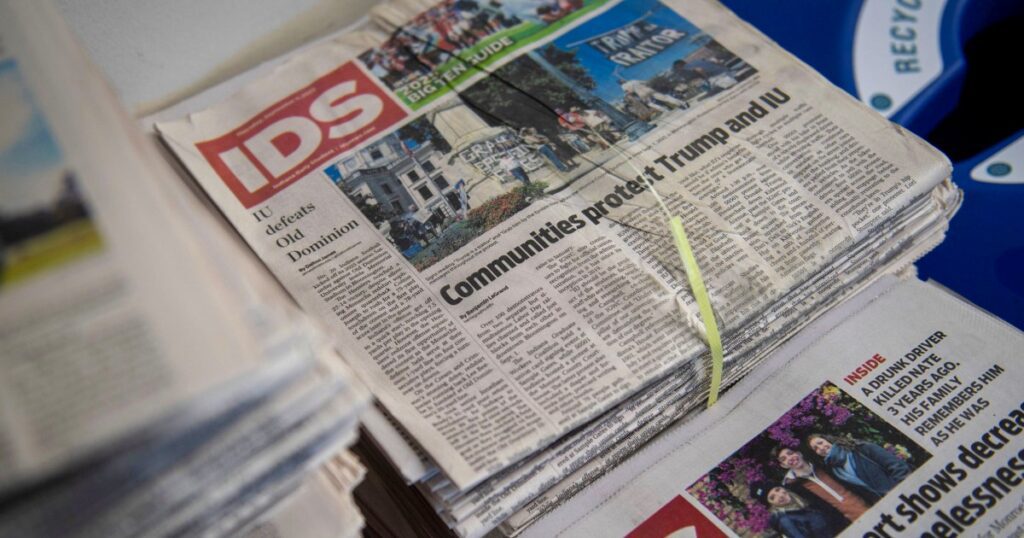The former director of student media at Indiana University and adviser to the student newspaper has filed a lawsuit against the school after he was fired two weeks ago, alleging his termination violated his constitutional rights following an ongoing censorship dispute.
Jim Rodenbush filed the lawsuit Thursday, just more than two weeks after the university terminated him from the Indiana Daily Student (IDS) newspaper on Oct. 14.
The lawsuit accuses the university of violating Rodenbush’s First and 14th Amendment rights.
“Freedom of the press and academic freedom are sacrosanct in the American imagination,” he said in the lawsuit.
The university fired him “in a direct assault on the rights guaranteed by the First Amendment” because he “refused the directive to censor student work,” Rodenbush alleges.
Indiana University said it does not comment on litigation.
The lawsuit states that he is seeking “declaratory and injunctive relief.” He is not suing for a specific amount of money, he told NBC News on Friday.
“The longer he isn’t in his job, the greater his damages are,” his lawyer, Jonathan Little, said by phone Friday.
The lawsuit makes note that the IDS received a charter in 1969 to protect its “independence and freedom,” as stated on its website. “Final content decisions and responsibility rest with duly appointed student editors and managers,” it adds.
However, the lawsuit claims, “in the weeks and months leading up to the termination of his employment, the IU Administration had directed Rodenbush to stop the students from printing any news.”
In the spring of 2025, Associate Dean Galen Clavio told Rodenbush that administrators were unhappy with news stories being included in the paper’s special editions, the lawsuit states.
At that time, the IDS’ print frequency had been reduced by the university from weekly to seven issues per semester, Rodenbush told NBC News on Oct. 16. The allegations Rodenbush made while speaking with NBC News are reflected in his lawsuit.
He said he was told that the school wanted to focus on “special” print editions because they generated the most revenue.
He said that he shared the administrators’ concerns with the IDS staff, but they continued to publish the special editions in the same way they had always done. “We did that for seven issues. The entire semester passed, and nobody said anything to us,” he added.
He said that in the fall, he faced more pushback from administrators who told him to remove traditional news coverage from the print newspaper.
During an IDS staff meeting Sept. 25 in which Rodenbush told Clavio that he “did not control what students published in the IDS,” the former student media director was “berated in front of his colleagues and other administrators,” according to the lawsuit.
Following that staff meeting, Rodenbush contacted the university’s human resources to file a formal grievance, the lawsuit says, explaining that he was then scheduled to discuss his grievance with David Tolchinsky, dean of the Media School, on Oct. 9.
On Oct. 7, Rodenbush sent an email to the IDS staff, according to the lawsuit. In that email, he passed on the “guidance” from the Media School administration that the IDS’ print publication should strictly focus on a special theme and should include “no other news at all, and particularly no traditional front page news.”
On Oct. 9, Rodenbush had his scheduled meeting with Tolchinsky— the lawsuit says — during which he told Tolchinsky that the administration’s interference in the content of the IDS’ print publication violated the First Amendment’s guarantee of freedom of the press.
Tolchinsky said that he expected Rodenbush to act as a “traditional newspaper publisher” who would “determine content,” adding that student media would need to be re-evaluated if Rodenbush did not agree, as outlined in the lawsuit.
Tolchinsky fired Rodenbush five days later, per a termination letter provided to NBC News by Rodenbush. Tolchinsky did not immediately respond to NBC News’ request for comment.
“Your lack of leadership and ability to work in alignment with the university’s direction for the Student Media Plan is unacceptable,” the termination letter said, adding that “leadership lost trust in your ability to lead and communicate appropriately on behalf of the university.”
The issue turned into a public dispute with allegations of censorship after the print newspaper was suspended.
Billionaire entrepreneur Mark Cuban on X wrote on Oct. 15 that he gave money last year to IU to fund its newspaper and added: “Not happy. Censorship isn’t the way.”
IU Chancellor David Reingold in a letter to the editors published online Thursday said “my decision had nothing to do with editorial content of the IDS.”
He said the firing “coincided with a convergence of long-term operational concerns related to the Student Media Action Plan” and that there was an annual deficit approaching $300,000.
Reingold acknowledged that the university could have dealt with the issues better.
“I recognize and accept that the campus has not handled recent decisions as well as we should have. Communication was uneven and timing imperfect,” he wrote.
When asked why he chose to sue the university, Rodenbush said that “the issues here are pretty crystal clear.”
“I was fired in retaliation for my unwillingness to follow through on this order, which amounted to censoring the Indiana Daily Student,” he added.

